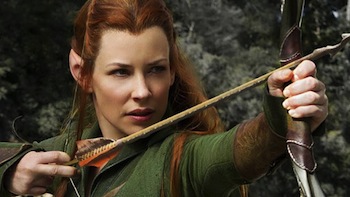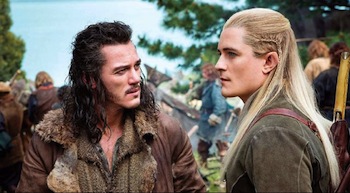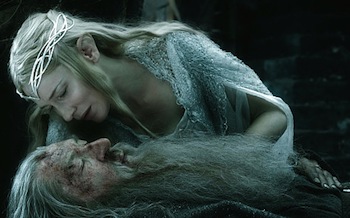A lot of harsh words have been and will continue to be written about the new movie musical remake of Annie, the Broadway mainstay about the Depression-era tyke who exists to teach her elders a few life lessons on the way to a sun-drenched "Tomorrow" (to co-opt the title of the show's best-known song). But from where I'm sitting, a disproportionate share of the film's self-evident faults are swept away by its impossibly irresistible young star, Quvenzhané Wallis. As long as Wallis is onscreen, it's damn hard not to smile in return and save one's gripes for later.

The worlds of marital abuse and artistic fraud collide to eye-opening if also frustrating effect in Big Eyes, Tim Burton's film about the unmasking of an elaborate deception that ruptures a family along the way. The film has would-be Oscar contender written all over it, not least in pairing five-time nominee Amy Adams alongside two-time winner Christoph Waltz, but for all that fascinates about the real-life story on view, its walk to the podium is likely to remain as much a fantasy as the claims of the central character, Walter Keane, to having been a great artist.

“Comedy is all about timing” quips Lloyd Christmas at one point, something this sequel to the Farrelly Brothers' crass, gross-out comedy from 1994 very knowingly mocks. Those who hold a fondness for Lloyd and Harry’s shtick may be amused by the huge number of in-jokes and the silly slapstick, but overall this instalment is more filler than killer and relies way too heavily on nostalgia.

This newly-restored version of one of MGM's most hallowed musicals is making the seasonal rounds with a run at the BFI and selected cinemas around the country. Directed by Joseph L Mankiewicz in 1955, the piece drips with period charm, while its pairing of Marlon Brando and Frank Sinatra is still capable of generating a box office buzz 60 years later. But (I'll just whisper this) it may seem like a bit of a slog for modern audiences.

Nothing proves a theory better than practice, and this is exactly what Norwegian adventurer-archaeologist-ethnographer Thor Heyerdahl did in 1947 when he and five companions sailed a raft from Peru to Polynesia to prove his hypothesis of how the Pacific islands were originally settled. He thought people first arrived there from the east, not the west, contravening the then-prevailing scientific orthodoxy. But Polynesians didn’t have boats, cried the establishment. Ah, but they had rafts, countered Heyerdahl.

Remembering the early years of social and sexual liberation in Swiss gay life, Stefan Haupt’s drama-documentary The Circle (Der Kreis) has rich affection for its subject. In particular, that’s the relationship between teacher Ernst Ostertag and drag artist Robi Rapp, who first met in the Fifties and have been partners ever since. Both now in their eighties, their documentary remembrances of the time are intercut with staged dramatic material concerning Haupt’s wider subject, the world that grew up around the magazine, social centre and club of the film’s title.

“At the end of all things,” to quote Frodo Baggins in the dim and distant future, there is purgative fire and resounding clangour in the final instalment of Peter Jackson’s The Hobbit triptych. Thirteen years after the release of The Lord of the Rings: The Fellowship of the Ring, Jackson has concluded his JRR Tolkien opus with an epic more thunderous than its two predecessors. The Battle of the Five Armies is also a little closer in tone to the LOTR films than An Unexpected Journey (2012) and The Desolation of Smaug (2013) – not that Bilbo Baggins’ prolonged burglary career can match the gravitas and eldritch weirdness that Jackson brought to Frodo’s Ring quest.
The relative power of Five Armies is paradoxical since it takes vast liberties with Tolkien’s text. Jackson and his co-writers – Fran Walsh, Philippa Boyens, and Guillermo del Toro – were always going to struggle to stretch the 317-page children’s book into three movies amounting to seven hours 54 minutes (at two hours 24 minutes, Five Armies is the fleetest). They padded out The Desolation of Smaug by contriving a romance between Kili (Aidan Turner), the handsome young Dwarf, and the unflappable Elf maiden Tauriel (Evangeline Lilly pictured below), herself invented to sustain female viewers’ interest.
 They also expanded the role of Bard (Luke Evans), the Lake-town archer-boatman, social conscience, and widowed father of three kids. Cate Blanchett’s Galadriel and Orlando Bloom’s Legolas were drafted in from LOTR to provide continuity and add star power, while Gandalf’s befuddled colleague Radagast the Brown (Sylvester McCoy), introduced in An Unexpected Journey, continued to add whimsy. He is clearly a gentle ancestor of ITV's irascible 1970s time-travelling wizard Catweazle.
They also expanded the role of Bard (Luke Evans), the Lake-town archer-boatman, social conscience, and widowed father of three kids. Cate Blanchett’s Galadriel and Orlando Bloom’s Legolas were drafted in from LOTR to provide continuity and add star power, while Gandalf’s befuddled colleague Radagast the Brown (Sylvester McCoy), introduced in An Unexpected Journey, continued to add whimsy. He is clearly a gentle ancestor of ITV's irascible 1970s time-travelling wizard Catweazle.
Tolkien purists will grouse, but adapting screenplays from beloved books invariably necessitates invention. The non-martial story elements Jackson and company dreamed up were egregious only because the promise of box-office gold mandated three Hobbit films instead of two. In themselves, they were acceptably Tolkienish and they’ve evolved naturally in part three (though surprisingly no comely Gondor or Mirkwood lass has been procured for the manly Bard, a working-class Aragorn substitute). Sadly, implausible CGI action sequences have cost Bilbo’s adventures the Anglo-Nordic mythical aura that never ceases to rise like a will o’ the wisp from Tolkien’s tale, maps, and illustrations.
What Five Armies lacks in the sinister, it makes up for in bellicosity and brio. In The Desolation of Smaug, the eponymous dragon (voiced like the resurrected Sauron by Benedict Cumberbatch) was disturbed from his cave in the Lonely Mountain by the unassuming but canny Bilbo (Martin Freeman), Thorin Oakenshield (Richard Armitage), and the Dwarves he's leading in search of their treasure, long jealously guarded by the monstrous worm. The story resumes with Smaug's vengeful swoops, belching fire, on the timber Lake-town where the panicking populace is fleeing. There’s more than a hint of the 1940 Blitz in Smaug’s ferocious attack; unlike London, Lake-town had to burn because its decadent Master (Stephen Fry) had despoiled it.
 Defeated by Sauron in part two, Gandalf (Ian McKellen) has been caged and suspended over a precipice. He escapes, of course, and makes for Dale, the ruined city below the mountain, and an inconsequential run-in with the Master’s aide, Alfrit (Ryan Gage), a craven sneak – more loutish than Grima Wormtongue, or Uriah Heep for that matter – who has arrived from Lake-town with the other refugees. (Pictured above: Luke Evans as Bard, Orlando Bloom as Legolas.)
Defeated by Sauron in part two, Gandalf (Ian McKellen) has been caged and suspended over a precipice. He escapes, of course, and makes for Dale, the ruined city below the mountain, and an inconsequential run-in with the Master’s aide, Alfrit (Ryan Gage), a craven sneak – more loutish than Grima Wormtongue, or Uriah Heep for that matter – who has arrived from Lake-town with the other refugees. (Pictured above: Luke Evans as Bard, Orlando Bloom as Legolas.)
Also assembed there are the settlement’s fighting men under Bard, a near mechanistic army of Elves led by Lee Pace’s snotty Thranduil (mounted on a giant stag), and a rabble of Dwarves led by Billy Connolly’s Dáin (seemingly modelled on Hägar the Horrible or Asterix the Gaul). They converge in hostility to decide the fate of the treasure, but unite to resist their common foes, the Goblins and Wolves sent by Sauron from his northern stronghold, Gundabad. The resulting massive battle follows or incorporates a succession of tense sallyings-forth and side-skirmishes that capture the impromptu savagery of close combat. Look out for Kamikaze trolls using their stone-capped heads as battering rams.
Bilbo and Gandalf are marginalized by Thorin’s role as the protagonist driven mad by his lust for the Arkenstone, the royal Dwarvish gem the Hobbit swiped from Smaug precisely because he knows covetousness is destructive. As with Théoden and Denethor in LOTR, Thorin’s weakness has made him an impotent leader – akin to the Fisher King of Arthurian mythology – who must be reawakened. It’s Bilbo who tries to rouse him; he also wields his own corrupting talisman, the Ring, more usefully than he does in the book. Gandalf winds up in a plight so dreadful that several familiar Middle-earth supremos – dei ex machina all – must show up to foil Sauron. (Pictured below: Cate Blanchett as Galadriel, Ian McKellen as Gandalf.)
 The shifting of focus onto Thorin is underwhelming because, as scripted, he’s arrogant but not dynamic, morose but not reflective – an avaricious low-grade Macbeth. Armitage makes a feint at tragic heroism, but he wasn’t armed with a tormented inner-life expressible in language. The part didn’t require a Shakespearian soliloquy bursting with metaphoric imagery: Gollum’s internal debate, delivered as a monologue by Andy Serkis in The Two Towers (2002), revealed in plain language (flavoured with Gollum-ese) how good and evil fight for control in everyone. Thorin's rallying never seems in doubt.
The shifting of focus onto Thorin is underwhelming because, as scripted, he’s arrogant but not dynamic, morose but not reflective – an avaricious low-grade Macbeth. Armitage makes a feint at tragic heroism, but he wasn’t armed with a tormented inner-life expressible in language. The part didn’t require a Shakespearian soliloquy bursting with metaphoric imagery: Gollum’s internal debate, delivered as a monologue by Andy Serkis in The Two Towers (2002), revealed in plain language (flavoured with Gollum-ese) how good and evil fight for control in everyone. Thorin's rallying never seems in doubt.
Redemption beckons when he fights the Orc captain Borg on an ice-plateau above a frozen waterfall in the Five Armies’ wittiest and most picturesque duel. Even this is upstaged, though, by Legolas clambering all over his Troll opponents in a ruck that echoes (or augurs) his calisthenics atop the Oliphaunt in The Return of the King (2003): a sop for the otherwise uptight Elf’s substantial fan base.
This raises the question of how Jackson’s now complete Tolkien hexatypch will work chronologically, the three Hobbit films preceding the three LOTR films. Five Armies ends peacefully in a way that leads directly, via the chilling prologue at the start of The Fellowship of the Ring, to Bilbo’s 111th birthday party and reluctant bequeathing of the Ring to Frodo. In the context of the latter’s more momentous journey, the Rings movies could eventually be seen as the brooding adult half of the saga’s forgivably chaotic, thrill-seeking adolescence.
Overleaf: watch trailers for The Hobbit: The Battle of the Five Armies

I don’t think any of us will look at a museum in quite the same way after this dazzling documentary. For several years the Austrian film-maker Johannes Holzhausen and his team followed what seems to be scores of the working staff inhabiting Vienna's Kunsthistorisches Museum (KMH), as they physically cared for the remarkable objects in their care, worried about how best to put them on view for the public, and met continually to discuss museum matters.

Finding a clear narrative among the deadly uncertainties of the long-lasting stand-off between Israel and Palestine is a challenge. Israeli documentarist Nadav Schirman, drawing on a real-life story, has honed The Green Prince down into a bare story of the ongoing contact between Gonen Ben Yitzhak, an officer of Israel's Shin Bet intelligence service, and Mosab Hassan Yousef, a young man from the very centre of the Palestinian leadership who becomes his agent.

Hong Kong master Wong Kar Wai has ventured into new territory with The Grandmaster. Many years in the making, his new film is a remarkable portrayal of martial-arts traditions, specifically the story of kung fu master Ip Man from his early life in mainland China on the eve of World War II, through to post-war exile in Hong Kong. It was there that he set up his own Wing Chun school, which would with time achieve huge international popularity; Ip went on to train future kung fu stars, most notably Bruce Lee.

